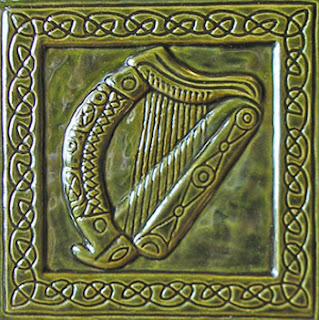6x6 relief carved ceramic Celtic Harp tile with a notch in the back for hanging.
Available from http://earthsongtiles.com
The harp has a place in the oldest of Irish traditions. Owned by the Dagda, a leader among the divine race of the Tuatha de Danaan, the harps melodies were bound in silence until his call summoned them forth. With it's two secret magical names it was the purveyor of sorrow, gladness and repose.
The harp was not only the principal musical instrument of ancient Ireland, it was their unique instrument which they concentrated virtually all musical ability on. Musical scholars say that due to the exclusive devotion to both playing and composing for the harp, Irish music was prevented from developing and widening. At one time Irish harpists, the best harpists known, were sought after, well payed and highly respected at court. But in the late 17th and early 18th century their prestige declined among the leading families partially due to new trends in music that the traditional Irish harpers were unable and un-inclined to keep up with. In 1792 Dr.Michael Mac Donnell along with Edward Bunting assembled the last Harpists in Belfast, which turned out to be a very small group of impoverished vagrants, to record and thus preserve some of the most distinctive Irish melodies and the last remains of a noble accomplishment.
~The Harp that once through Tara's halls~
The harp that once through Tara's halls,
the soul of music shed,
now hangs as mute on Tara's walls,
as if that soul were fled.
So sleeps the pride of former days.
So glory's thrill is o'er.
And hearts that once beat high for praise,
now feel that pulse no more.
No more Chiefs and ladies bright,
the harp of Tara swells.
The chord alone that breaks the night,
a tale of ruin tells.
This freedom now so seldom wakes,
the only throb she gives,
is when some heart indignant breaks,
to show that she still lives.


No comments:
Post a Comment